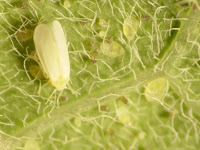
Based on early reports, 2009 may be another challenging year for whitefly management. In other states, Q-biotype whiteflies have been detected in some rooted cuttings shipments. I have not heard of any problems in East Texas so far this year. That does not mean East Texas producers don’t need to be on the lookout for problems or have a good management program in place.
A good whitefly management program must have two goals. First, is to produce a high quality, salable crop for the consumer. Second, but of equal importance, is preserving the chemical tools available to manage whiteflies. If we do not maintain the viability of effective chemical tools, it will be difficult for many growers to produce a salable crop. Consequently, the wise use of chemicals, through a scientifically based IPM program, is essential in this 21st Century. Europe has seen, and is suffering from, the results of over spraying whiteflies. Insecticide misuse in the United States may result in whitefly populations that cannot be controlled. It is important to remember that the Q-biotype whitefly is already resistant to a number of products commonly used. Chemical overspray could easily lead silverleaf whitefly resistance.
The Q-biotype Task Force asks you to collaborate with us in this effort. It’s not just about the challenges posed by the Q-biotype. It’s about avoiding resistance development in any whitefly population.
We have developed the “Management Program for Whiteflies on Propagated Ornamentals”. It’s available at http://www.mrec.ifas.ufl.edu/LSO/bemisia/bemisia.htm. This program is based on the best scientific data developed to date by the Whitefly Task Force scientists. Do not rely on just one or two effective products, but instead integrate products with different modes of action to decrease the potential for developing resistance.
With support from Color Spot Nurseries, the Society of American Florists and the Agriculture Research Service, I am evaluating rotation programs from the Management Program. The results from my trials and other entomologist around the country will be used to update the plan in 2010.
If you have whitefly control problems contact me so we can get your whiteflies biotyped. Q-biotype whiteflies have never been document in Texas.
REMEMBER: Q-BIOTYPE WHITEFLIES ARE A DOCUMENTED THREAT, BUT THERE IS ALSO EVIDENCE THAT B-BIOTYPE ARE DEVELOPING RESISTANCE AS WELL. Only by working cooperatively, wisely, and together can agriculture solve this problem.
No comments:
Post a Comment